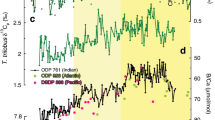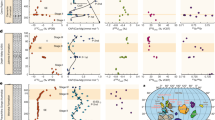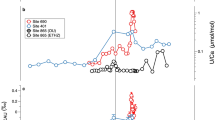Abstract
It has been suggested that the partial pressure of carbon dioxide in the terrestrial atmosphere was larger in the past than it is at present1–4. In particular, partial pressures of 100–1,000 times those of the present have been invoked for the early Earth as a means of insuring equable climates at a time when the Sun was significantly less luminous5–7. While the climatic argument is not conclusive8, it is worth considering whether the geological record is in any way inconsistent with the proposed high partial pressures of carbon dioxide. I now examine the potential impact of high carbon dioxide partial pressure on ocean chemistry and ask what constraints are imposed by the known record of chemical sedimentation through time. The evidence consists of the persistence throughout almost the entire sedimentary rock record of calcium carbonate and sulphate precipitation. I adopt a uniformitarian point of view that assumes no very great change in the conditions for the deposition of these chemical sediments. The methods of Holland9 are used to set limits on the composition of the water from which precipitation occurred. I find no inconsistencies between the sedimentary rock record and presumed higher partial pressure of carbon dioxide early in Earth history, provided that high partial pressure was accompanied by a generally lower pH for seawater, higher concentrations of calcium and bicarbonate ions, and lower concentrations of carbonate and sulphate ions.
This is a preview of subscription content, access via your institution
Access options
Subscribe to this journal
Receive 51 print issues and online access
$199.00 per year
only $3.90 per issue
Buy this article
- Purchase on Springer Link
- Instant access to full article PDF
Prices may be subject to local taxes which are calculated during checkout
Similar content being viewed by others
References
Holland, H. D. in The Early History of the Earth (ed. Windley, B. F.) 559–567 (Wiley, London, 1976).
Hart, M. H. Icarus 33, 23–39 (1978).
Henderson-Sellers, A. & Cogley, J. G. Nature 298, 832–835 (1982).
Veizer, J. Contr. Miner. Petrol. 38, 261–278 (1973).
Owen, T., Cess, R. D. & Ramanathan, V. Nature 277, 640–642 (1979).
Walker, J. C. G., Hays, P. B. & Kasting, J. F. J. geophys. Res. 86, 9776–9782 (1981).
Walker, J. C. G. Paleogeogr. Paleoclimatol. Paleoecol. 40, 1–11 (1982).
Rossow, W. B., Henderson-Sellers, A. & Weinreich, S. K. Science 217, 1245–1247 (1982).
Holland, H. D. Geochim. cosmoschim. Acta 36, 637–651 (1972).
Riley, J. P. & Chester, R. Introduction to Marine Chemistry (Academic, New York, 1971).
Walker, J. C. G. Evolution of the Atmosphere (Macmillan, New York, 1977).
Allaart, J. H. in The Early History of the Earth (ed. Windley, B. F.) 177–189 (Wiley, London, 1976).
Broecker, W. S. Chemical Oceanography (Harcourt Brace Jovanovich, New York, 1974).
Walker, J. C. G. et al. The Earth's Earliest Biosphere: Its Origin and Evolution (ed. Schopf, J. W.) (Princeton University Press, in the press).
Holland, H. D. The Chemistry of the Atmosphere and Oceans (Wiley-Interscience, New York, 1978).
Brimblecombe, P. & Walker, J. C. G. J. geophys. Res. (submitted).
Brimblecombe, P. & Walker, J. C. G. J. geophys. Res. (submitted 1982).
Drever, J. I. Bull geol. Soc. Am. 85, 1099–1106 (1974).
Holland, H. D. Econ. Geol. 68, 1169–1172 (1973).
Ewers, W. E. in 4th int. Symp. Environmental Biogeochemistry (eds Trudinger, P. A. & Walter, M. R.) (Springer, New York, 1980).
Button, A. et al. in Mineral Deposits and the Evolution of the Biosphere (eds Holland, H. D. & Schidlowski, M.) 259–273 (Springer, Berlin, 1982).
Walker, J. C. G. Life sci. Space Res. 8, 89–100 (1980).
Sellers, W. D. Physical Climatology (University of Chicago Press, 1965).
Veizer, J., Compston, W., Hoefs, J. & Nielsen, H. Naturwissenschaften 69 173–180 (1982).
Cameron, E. M. Nature 296 145–148 (1982).
Veizer, J. in The Earth's Earliest Biosphere: Its Origin and Evolution (ed. Schopf, J. W.) (Princeton University Press, in the press).
Lovelock, J. E. & Whitfield, M. Nature 296, 561–563 (1982).
Lovelock, J. E. & Watson, A. J. Planet. Space sci. 30, 795–802 (1982).
Walker, J. C. G. in Comparative Planetology (ed. Ponnamperuma, C.) 141–163 (Academic, New York, 1978).
Fryer, B. J., Fyfe, W. S. & Kerrich, R. Chem. Geol. 24, 25–33 (1979).
Author information
Authors and Affiliations
Rights and permissions
About this article
Cite this article
Walker, J. Possible limits on the composition of the Archaean ocean. Nature 302, 518–520 (1983). https://doi.org/10.1038/302518a0
Received:
Accepted:
Published:
Issue Date:
DOI: https://doi.org/10.1038/302518a0
This article is cited by
-
Habitability of the early Earth: liquid water under a faint young Sun facilitated by strong tidal heating due to a closer Moon
PalZ (2021)
-
Single-molecule paleoenzymology probes the chemistry of resurrected enzymes
Nature Structural & Molecular Biology (2011)
-
The Relative Rates of Thiol–Thioester Exchange and Hydrolysis for Alkyl and Aryl Thioalkanoates in Water
Origins of Life and Evolution of Biospheres (2011)
-
Phosphate Solubility and the Cyanate-Mediated Synthesis of Pyrophosphate
Origins of Life and Evolution of Biospheres (2007)
Comments
By submitting a comment you agree to abide by our Terms and Community Guidelines. If you find something abusive or that does not comply with our terms or guidelines please flag it as inappropriate.



